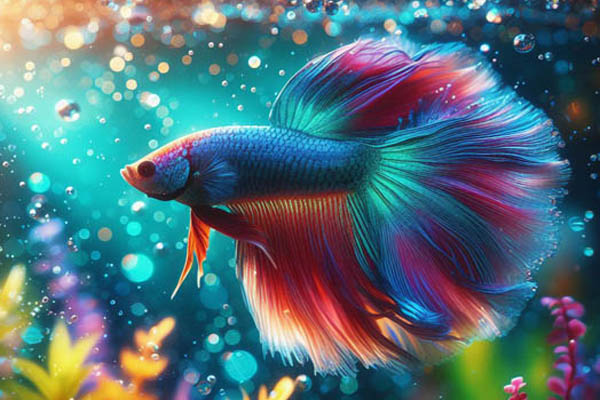What Kind of Water do Betta Fish Need?
Betta fish need dechlorinated water or calm, treated tap water that should be around 77-82°F (23-27°C) to replicate their natural habitat. Here’s a detailed guide on the kind of water betta fish need to thrive:
1.) Water Source and Treatment
The journey to optimal betta fish care begins with the water source. Tap water is commonly used and is a convenient option for most betta owners.
However, it often contains chlorine, chloramines, and heavy metals, which are harmful to betta fish.
To make tap water safe, it must be treated with a water conditioner that neutralizes these chemicals.
Alternatively, spring water can be a viable option as it naturally contains essential minerals beneficial for bettas.
However, one must steer clear of distilled water, as it lacks these minerals and can lead to a sterile environment for the fish.
In addition, betta fish owners may opt for gallon-sized bottles of spring water as an alternative water source, ensuring it contains essential minerals for their bettas’ well-being.
To maintain the warm temperatures bettas thrive in, an aquarium heater is indispensable, especially in colder climates, while diligently treating tap water with a conditioner becomes routine practice.
Some enthusiasts may even choose specialized products like API Betta Water to cater to their fish’s specific needs.
2.) Temperature: The Warmth They Require
Betta fish hail from the warm waters of Southeast Asia and require a similar environment to flourish.
The ideal temperature range for betta fish is between 76° and 82° Fahrenheit (24° to 27° Celsius).
Maintaining this temperature is vital, as bettas are sensitive to temperature changes, which can stress them and lead to health issues.
In colder climates or rooms, an aquarium heater becomes an indispensable tool to ensure the water remains within this warm range consistently.
3.) Water Quality: The Key to Health
The quality of water in a betta fish’s tank is paramount. These fish prefer clean water with minimal fluctuations in pH levels.
The target pH range for a betta-friendly habitat is between 6.8 and 7.5, which is slightly acidic to neutral. To maintain high water quality, regular water changes are essential.
Removing a portion of the tank water and replacing it with fresh, treated water helps keep ammonia and nitrate levels low.
A filter can also aid in maintaining a clean environment by removing debris and promoting the circulation of oxygen-rich water.
In conclusion, betta fish require specific water conditions that mimic their natural habitat to stay healthy and active.
By ensuring the water source is treated, the temperature is warm, and the water quality is high, betta owners can provide a thriving environment for their aquatic pets.
Remember, the key to a happy betta is the environment you create for them.



